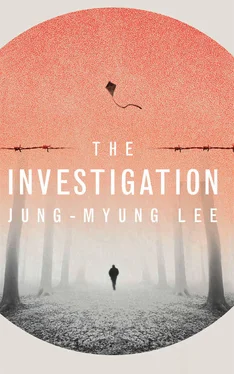‘Nowhere in this poem can you find nationalism or a hint of rebellion. It’s just the pure heart of a boy who is in love for the first time.’
Maeda glared at him, suspicious. ‘Hiranuma is a careful man. He would have stuck a lyric poem in with the rest just to confuse the censor. He probably knew he would get arrested.’
‘That’s not true. This poem conveys Hiranuma’s true feelings.’
‘No, he’s hiding his true colours. Suni probably doesn’t even exist!’
‘Suni is not an imaginary woman!’ Sugiyama unwittingly raised his voice.
Hasegawa glared at him.
Sugiyama tore through the manuscript again to the page he was looking for:
SNOWING MAP
On the morning of Suni’s departure large snowflakes fall with unmentionable feeling onto the map laid sadly far away outside the windows.
I look around the room, but nobody is there. The walls and ceiling are white. Is it snowing even inside? Are you really leaving, like lost history? Though I write in a letter what I wanted to say before you left, I don’t know where you’re going, which street, which village, under which roof; are you left only in my heart? The snow keeps covering your small footprints so I cannot follow them. When the snow melts, flowers will bloom in your footprints; looking for your footprints among the flowers, it will keep snowing in my heart for twelve months a year.
‘“Boy” and “Snowing Map” are serial poems written two years apart,’ Sugiyama explained, pointing at the dates. ‘“Boy” depicts the heart of a young boy in love, “Snowing Map” is about a young man’s despair at lost love. If the first poem was only here to fool us, he wouldn’t be able, two years later, to miss the same character this desperately in the same tone.’
Maeda looked uncertain. ‘You’re not bad at deciphering poems.’
‘I just need one day. I’ll select the poems to be incinerated and report back.’
Maeda waved his hands. ‘No, there’s no point. Just burn them all now!’
‘But don’t you agree that these two are just lyric poems?’
‘Well, that’s the problem. They’re more dangerous because they’re not seditious. Whining about love when the entire citizenry has tightened its belt and is fighting against American and British aggressors? Decadent poems like these weaken the do-or-die pledge.’
‘But after the war, they’ll be able to heal people’s hearts,’ Sugiyama insisted, not noticing that his voice was rising.
Maeda snapped, ‘You don’t need to concern yourself about that. We will be victorious at the war’s end. The Great Japanese Imperial Military will chase the aggressors to the end of the world and exterminate them.’
‘After the war our people might need these poems. It wouldn’t aid the Empire to burn all of this.’
‘I appreciate these aren’t ordinary poems, especially seeing how confused they made you. That’s why we need to get rid of them. They’re dangerous.’
Thoughts he couldn’t utter echoed in Sugiyama’s mind. He slowly yanked the rusted steel door to the incinerator. It screeched open. The air choked with the smell of smoke as dust and ash billowed up. Maeda gave Sugiyama an impatient nod. The manuscript trembled in front of the flames lungeing to swallow it — it contained one young man’s lost dreams and agonized repentance. Sugiyama’s hands were shaking.
‘What are you waiting for?’ Maeda urged. ‘The arsehole got you to let down your guard. And all the while he wrote all these banned poems. He fooled you. I won’t question your judgement. I know these types always target good guards like you.’
Sugiyama ripped out the first page of the manuscript. The flame from his lighter licked the edge of the crumpled paper, swallowed Dong-ju’s neat handwriting and ignited the banned sentences. One word at a time, one line at a time, one page at a time, Sugiyama ripped apart the manuscript and tossed it into the fire.
‘Self-Portrait’, ‘Night Looking Back’, ‘A Dear Memory’.
He glanced at the piece of paper in his hands, the shadow of the fire looming over the words:
A DEAR MEMORY
One spring morning, in a small station in Seoul
Waiting for the train as I would wait for hope and love,
I cast the shadow of exhaustion on the platform
And smoked a cigarette.
My shadow let out a shadow of smoke,
As a herd of doves flew up without shame
their wings reflected by sunlight.
The train took me far away
Without any news
After spring left — in a quiet boarding house room
in the outskirts of Tokyo
I long for myself on the old streets as I would long
for hope and love.
Today too the train goes by several times,
Today too I will wait for someone
Pacing the hill close to the station.
— Ah, youth! Stay there a while.
Dong-ju had written this a year ago, as a lonely student in Tokyo. The world had been cold and grey, filled with the smell of gunpowder. Sugiyama threw the poem into the fire. What Dong-ju had looked for in a small station vanished in the flames. Nobody would ever know that this poem had existed. Sugiyama closed his eyes. He didn’t want to witness his actions as he murdered the young man’s soul. He found himself wishing that time would pass quickly, that all the poems would disappear without a trace. He wanted to sweep the remnants, bury them and scrub his dirty hands until everything disappeared — the trace of ash on his fingertips, the smell of flame threaded into his clothes, the memory of the dead poems. But his guilt would remain, caked on like soot. Sugiyama opened his eyes and glared into the incinerator. It was your fault, Dong-ju. You did something you shouldn’t have. I won’t forgive you for making me do something so terrible.
‘Good! That’s taken care of then.’ The flames danced on Maeda’s face. ‘After all that time in solitary, the arsehole won’t think about writing a poem again.’
‘Yes, sir.’ Sugiyama realized then that his throat had closed up and his eyes were wet.
Two weeks later, the poet limped out of solitary. Sugiyama was relieved to see Dong-ju walk out on his own, although he did so on shaking legs. His soul had been forever altered. Though weak, he became aggressive, skulking around gloomily. He picked fights with everyone and threw sloppy punches, even though he couldn’t actually beat anyone up. He limped towards solitary again, covered in blood.
A week later, he crawled out and became ghost-like. His blank gaze was fixed on the horizon, and he looked lost in time. The blue kite that had floated hopefully outside the prison walls every afternoon stopped appearing. Dong-ju’s depression tugged the entire ward into a deep slump. Sugiyama missed the young man with a ready smile. He remembered one of Dong-ju’s poems that he’d read in front of the incinerator before turning it into smoke that snaked up to the sky:
ROAD
I lost it.
Not knowing what I lost where
my two hands feel my pockets
as I go out onto the road.
The road snakes along the stone wall
Endlessly linking stone and stone and stone.
The wall’s steel doors are firmly closed
Casting a long shadow on the road
And the road goes from morning to evening
And from evening to morning.
When I look up after shedding tears along the stone wall
The sky is embarrassingly blue.
I walk down this grassless road
Because I’m on the other side of the wall,
Читать дальше












